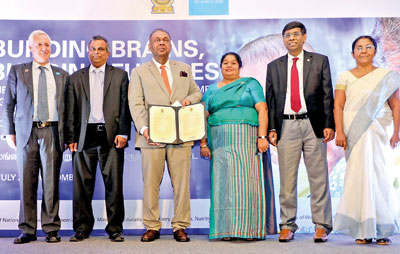Early childhood development to play significant role in 2019 budget
While education is at the heart of empowerment endowing people with skills to actively participate in the economy and development of the country, investment in Early Childhood Development (ECD) is of great importance to Sri Lanka as it has the potential to improve school learning outcomes which can have long lasting effects on the well-being of the population.

The Minister of Finance accepts proposals to increase funding. (From left) - Tim Sutton (Representative, UNICEF Sri Lanka); K.D.S. Ruwanchandra (Secretary, Ministry of National Policies and Economic Affairs; Mangala Samaraweera (Minister of Finance and Mass Media); Ms. Ashoka Alawatte (Secretary, Ministry of Women and Child Affairs); Janaka Sugathadasa (Secretary, Ministry of Health, Nutrition and Indigenous Medicine) and Ms. Badra Vithanage (Director – Education for All Branch of the Ministry of Education)
Minister of Finance and Mass Media, Mangala Samaraweera made these remarks at the ‘Building Brains Building Futures’ event held at the Cinnamon Lakeside Hotel in Colombo on Monday. Three proposals related to ECD were presented to the minister for consideration in the 2019 budget.
Mr. Samaraweera stated, the fundamental principle of government’s economic development policy is empowerment of Sri Lanka’s citizens. “We want to create an economy where citizens are able to take their economic destiny in their hands without relying on the state.”
ECD enhances school readiness, children increase their retention rates and achieve better results in standardised tests leading to a reduction in school dropout rates.
By learning more and for longer periods of time children are able to benefit the most from the schooling system overall. ECD interventions have better benefit cross ratios, allowing the government to maximize the returns of the public investment in education. Studies across the world have proved that children who participate in ECD programmes attain higher earnings, he added.
He also mentioned that investment in ECD helps government provide a social endowment to future generations, reducing income disparities in society. The government is aiming to increase investments in enhancing education quality in two initiatives; 13 years of education programme and budget proposal for a public-private partnership model for child care facilities. The first 13 years of education programme aims at adapting the school system to enhance different types of skills children have and to adequately respond to the needs of the labour market. An exam-centric curriculum has resulted in a large dropout rate after O/L. Modifying the curriculum in a way that it responds to the creative and technical skills of children will allow better exploitation of their potential and help retain them within an efficient school system. ECD is a perfect initiative to achieve the proposed goals in the education front. The childcare facilities initiative will be a first step in promoting quality services for the early childhood stage.
Mr. Samaraweera reiterated the government’s commitment for investment in education with renewed focus on ECD. The government has increased the investment in education from 1.46 per cent in 2015 to 3.5 per cent in 2017 and the goal is to reach 6 per cent by 2025.
UNICEF Regional Director for South Asia, Jean Gough at the event emphasized that Sri Lanka is a trailblazer in terms of human capital investments in the South Asian region. This position is because of enlightened and consistent health and education policies implemented by the government over a number of years.
Compared to other countries in South Asia, Sri Lanka has advanced in these areas, she added.
As Sri Lanka becomes a knowledge based economy, growth will be driven by innovation of its workforce who will produce knowledge-based products and services.
The market for these products and services and trading partners are likely with the fast growing economy in the Asia Pacific region. “Unless Sri Lanka invests on its workforce to enable innovation and increase productivity to meet the needs of the future, it will be trapped in the middle class status unable to transform its economy. This will result in a struggle to compete in the existing knowledge-based economy in the region,” she noted.


